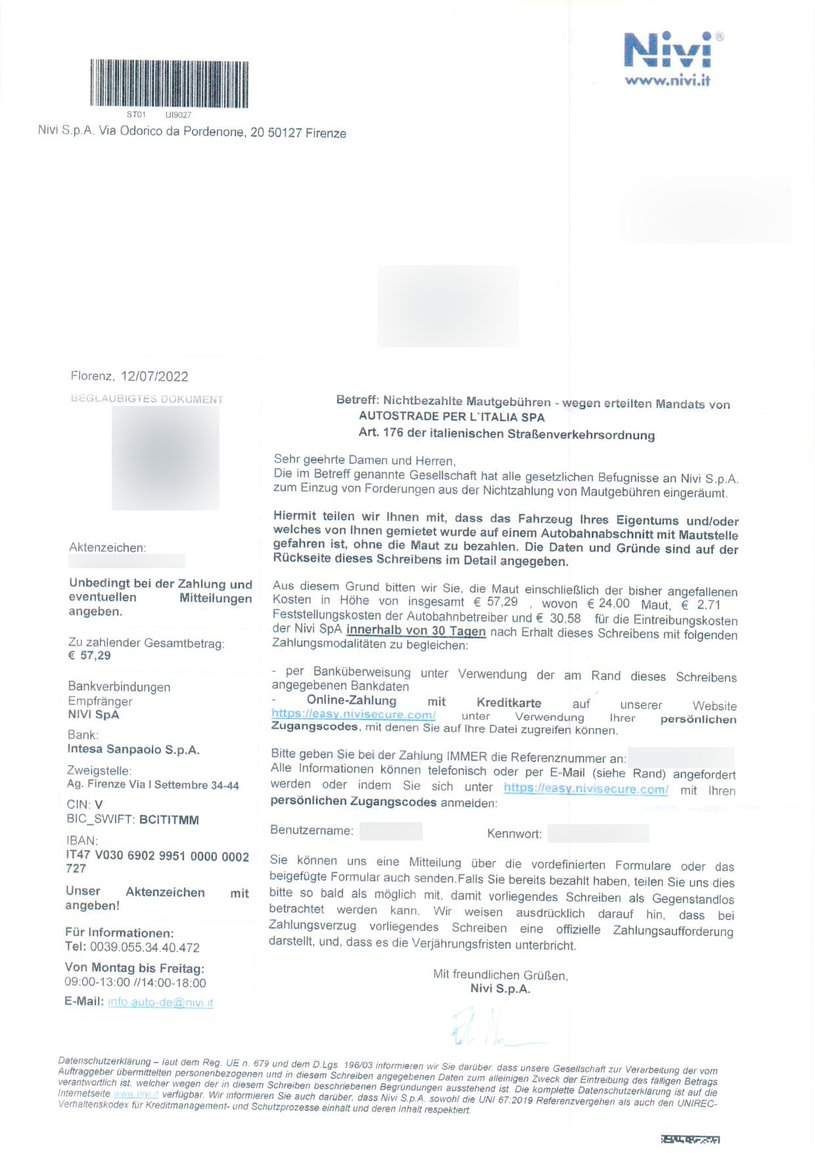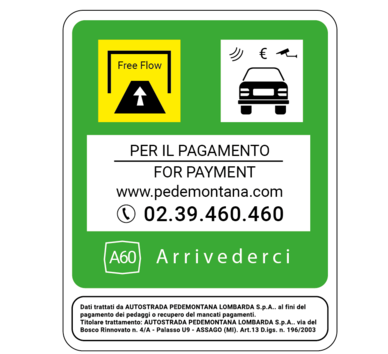Italy: letter of reminder for unpaid tolls
Anyone travelling by car in Italy may receive a letter from the Italian company Nivi SpA on their return. The reason is usually an unpaid toll. Many travellers are unsure and wonder whether the demand is correct and whether they have to pay.
The European Consumer Centre Germany explains what is important.
When travellers in Italy receive a request to pay the extra toll, they are usually astonished.
"How can they ask me to pay an extra toll? I'm sure I paid the toll - the barrier finally opened," is a common request to the ECC Germany.
First of all, for safety reasons, the barriers on Italian motorways always open after a certain time, regardless of whether you have paid or not.
In addition, there are sections of toll motorway in Italy that no longer have toll barriers.
If you use a toll motorway in Italy and have not paid the toll, for whatever reason, you are still legally obliged to pay. The best thing to do is to pay the missed toll immediately.
Claims against foreign drivers are collected by the Italian debt collection agency Nivi SpA, based in Florence.
Free flow toll system without barriers
The so-called "free-flow" toll system applies to the A36 (Pedemontana), A59 (Como) and A60 (Varese) motorways near Milan.
In order not to disrupt the flow of traffic, there are no fixed toll booths or barriers.
Vehicles are automatically registered by cameras as they pass through. The amount to be paid is calculated on the basis of the vehicle's registration number and model.
Here is a map showing the sections of motorway that use the Free Flow system. More sections are likely to be added in the future.
Payment at the toll station did not work
It can happen that a card payment is not accepted at the toll station, even though the card is valid. You will receive a receipt with the words "Mancato pagamento", which means "not paid".
You will be asked to pay the toll on presentation of the receipt. Many drivers think this is just a receipt and throw it away carelessly.
Moving to the wrong lane ("Telepass")
If you move into a Telepass lane on Italian motorways, you will only be able to pay the electronic toll using an on-board unit. There is no other payment option on these lanes. For safety reasons, the barrier will open even if you haven't paid.
The toll operator will then ask for the amount due.
Paying for missed motorway tolls - how it works
If you have been issued with a "mancato pagamento" at the toll station, you can pay the toll online here.
If you did not receive a receipt, e.g. because you used the Telepass lane by mistake, you should contact the motorway operator immediately to settle the amount.
Here are the contact details for the main motorway operator, Autostrade per l'Italia.
And here are the contact forms for other motorway companies.
Don't forget to provide the following information:
- Route travelled
- the date
- Number plate
Experience has shown that it can take up to 4 weeks to receive a reply.
Alternatively, you can pay the toll on the spot at one of the "Punto Blu" motorway service points. These are located at larger service areas along the motorways.
Can I appeal against a toll demand?
If you do not understand a demand for payment or think there is a mistake, you can appeal to the collection agency. This should be done as soon as possible to avoid further reminders.
On the claim letter from Nivi SpA you will find a link with your personal access data to your file.
When you enter this on the relevant page, you will be able to access the entire case, including photos. You will also find the contact details for filing an appeal.
Frequently asked questions about debt collection letters from Italy
If you have used Italian motorways, you have to pay.
This is the case even if you are not at fault (e.g. the machine was faulty).
Normally not.
Under Italian law, claims for unpaid tolls are only time-barred after 10 years.
The toll operator can make full use of this period.
So don't be surprised if the toll claim arrives years later.
Nivi SpA is an Italian debt collection company.
Autostrade Italia, the Italian motorway operator, has appointed Nivi SpA to collect unpaid tolls from foreign vehicle owners.
Nivi SpA does not have direct access to German owner information.
However, the Kraftfahrt-Bundesamt (Federal Motor Transport Authority) will provide owner information if there is a legitimate interest.
A claim for unpaid toll is sufficient to constitute such a legitimate interest.
Under Italian law, the driver and the owner are equally liable.
If you did not drive, you can ask the driver for a refund. However, you must still pay yourself first.
Under Italian law, costs incurred in the collection of unpaid tolls may be charged.
In addition to personnel costs, there are also fees for owner information and for sending letters as part of the follow-up collection process.
Like any other private claim, an unpaid toll can be taken to court.
However, Nivi SpA is not authorised to do this. It only works out of court.
If you do not pay, your case may be referred to a lawyer with legal standing.
According to Nivi SpA, a reminder is always preceded by a request for payment. Both are sent to the same address.
It is not possible to explain why sometimes only one of the letters arrives.
According to Nivi SpA, a second letter does not lead to an increase in fees.
If you need help or support, you can contact free of charge
Funded by the European Union. Views and opinions expressed are however those of the author(s) only and do not necessarily reflect those of the European Union or the European Innovation Council and Small and Medium-sized Enterprises Executive Agency (EISMEA). Neither the European Union nor the granting authority can be held responsible for them.




